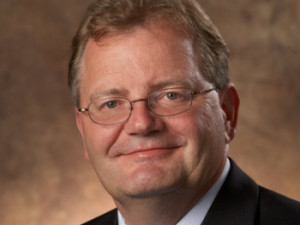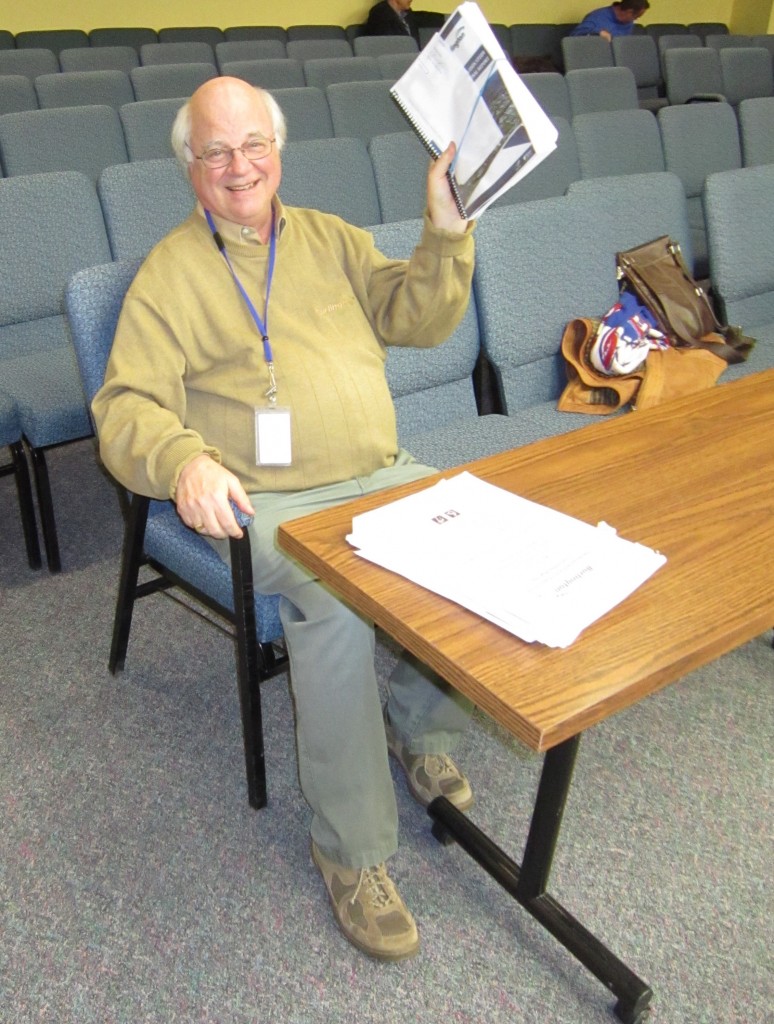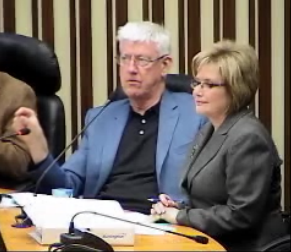 By Pepper Parr
By Pepper Parr
July 8, 2014
BURLINGTON, ON.
Kim Phillips. General Manager Corporate and Community Services leaves the city payroll at the end of July. Tom Eichenbaum, Director of Engineering also leaves at the end of July – both move to that place, where pension cheques get deposited regularly and the email traffic is a lot smaller.

Retiring General Manager Kim Phillips on the job during a United Way fund raising week.
That leaves Burlington with just the one General Manager and a City Manager, who serves as an interim until at least after the election and probably into 2015. It is certainly not what you would call a top heavy organization.
Probably the biggest task on interim city manager Pat Moyle’s desk is the workforce plan, he will put to council during a Committee of the Whole meeting, with his rationalization for a new structure. Moyle, who has a strong municipal background, much of which wasn’t made public when he was appointed, explains that Burlington is basically out of the “greenfield” business – that phase, where we just took large swaths of land and plunked down suburban bungalow after suburban bungalow and kept building north of the old city that sort of ended at about Caroline Street.
The development charges for all this construction kept the city coffers full – life was good.
The decision made to maintain a large rural sector that will not permit development north of Dundas is said to be cast in stone – but this reporter has heard economic development people talk of at least some form of development on the north side of highway 407 – which would be the thin edge of the wedge.
The rural boundary creates other problems because there basically was no plan –other than that there would be no development – which is what allowed the air park growth to get out of hand.
The province has told Burlington to get into the intensification business – and we are getting there, but not with the joy and determination with which we built all those bungalows.
Moyle explains that we don’t need a city bureaucracy focused on new growth and development – we need a bureaucracy that does fixing and maintaining and providing programs and services for a population that now has a lot more older people than there were in those prime development days.
The financial structure has changed as well. Moyle, with the experience he gained while serving as CAO for the Region, explains that most of our infrastructure is paid for – the waste and sewage structure is basically complete. The major road work to be done is on arterial roads which are a regional responsibility. “All we have to do is maintain the local roads we have” says Moyle – which Councillor Dennison will remind him that we are millions of dollars behind.
Moyle has a decidedly different view of the city’s financial position than that of his predecessor Jeff Fielding, and looks forward to a Council meeting in September, when he brings forward the Results Based Accountability approach the city will be taking for the 2015 budget.
It isn’t often that one sees bureaucrats getting excited, especially when they are talking about numbers, but Pat Moyle gets a gleam in his eye, when he talks about the people in finance and the change they were asked to make by Jeff Fielding; how the money was spend and the work they do gets explained to the public.

A career as a municipal civil servant, who believes the culture of every city hall should be: You are here to serve.
When Jeff Fielding bought a one way ticket to Calgary, the city found itself in an awkward spot. It needed a city manager and found one in Pat Moyle. It was a good fit and he had the capacity to take the city through the recruiting and selection of a new city manager. The problem was that he had one of his two general managers retiring and had to come up with a staffing plan that would work for the new kind of organization the city needed.
When a new head honcho is hired that person usually wants to create their own team and put their own stamp on the organization they will run. Kind of hard to do that if the person they hire sees the situation a little differently – unless Council decides to hire someone who buys into the decisions that have already been made – which kind of limits the choices.
Moyle has some pretty clear ideas on how the hiring process should go. Because of his extensive municipal experience there isn’t anyone out there, at least in Ontario, that he doesn’t know and he probably knows, who the top talent is in the rest of the country.
The plan, as Moyle explains it, is to advertise, review the resumes and then ask the short list to do some “game playing”. Each candidate would be given an information package and asked to design or scope out how they would organize the city to meet the challenges set out in the information package. It will be a little like putting them in a sandbox and giving all of them the same tools and toys and then watching what they build.
A good approach – but who will pull together the information package. Jeff Fielding saw the city’s financial situation one way – Pat Moyle sees it differently. Councillor Paul Sharman will tell you that the data is what matters most. Garbage in results in garbage out.

The dean of city council with more than 22 years in the building has his hat in the ring for yet another term.
All this will begin once there is a new council in place. October 28th will tell us who will be sitting around the horseshoe. While ward 1 has a growing number of candidates nominated – not always a good sign, one of them is going to have to come up with a very strong campaign to beat Councillor Craven. If there is an upset in ward 1 – it will stun most people, but elections are funny things – ask Cam Jackson.
Meed Ward is a shoe-in for ward 2 unless she pulls the faux pas of the year. John Taylor can’t be beaten in ward 3 at this point. Dennison is in trouble in ward 4 but that community doesn’t yet have the person that can take him down. There is word that Brian Heagle might put his hat in the ring. However, few are betting against the old fox but many want him out of office.

Councillors Sharman and Lancaster – both newbies and both members of the group that produced the Shape Burlington report that basically went nowhere: will the same be said for these two council members. Lancaster has a field of six running against her,
Sharman has a race in ward 5 and Lancaster has a battle in ward 6 – perhaps an epic one for her. With six people running against her – her hope is that the vote gets split and she comes up the middle. Jennifer Hlusko appears to be doing the kind of work that gets a candidate out in front.
The city could have three new council members come the end of October.
Those are the people that will make the decision as to who the next City Manager should be. Keeping someone in the city manager’s chair has been a bit of a challenge for Burlington. Roman Martiuk didn’t complete his five year contract, Jeff Fielding left for bigger and he thinks greener pastures and Pat Moyle is with us as a care taker – a quality care taker, but nevertheless the guy that is keeping the good ship Burlington upright, while general manager Scott Stewart does all the grunt work and Kim Phillips gets ready for her goodbye party.
The best way to understand Pat Moyle is to look at his very extensive municipal experience and use it as a guide as to how he works. Moyle got into the municipal world as a planner after graduating from Ryerson. Much of his experience has been with northern Ontario municipalities His work with the Association of Municipalities of Ontario (AMO) kept him in touch with the municipal community across the province and because Ontario was he most powerful province, he worked closely with all the other provincial municipal associations.
Moyle was with AMO during the Harris/Eves years when the province downloaded service delivery, but no money to the municipal level. Moyle learned in the trenches how one has to deal with a provincial government that basically turned the tables over.
This depth of experience, especially the time spent at the Region, results in a view of Burlington and its problems that few have and allows Moyle to look for specific skill sets and approaches to problem solving, as he prepares to bring forward candidates for the job of City Manager for Burlington.
There are always internal candidates; Moyle talked of one situation, where there were more than three internal candidates and none got the job. Burlington doesn’t have a tremendous amount of bench strength at the director level and there are a number of people due for retirement.
The work being done by the finance department as they prepare for a Result Based Accountability (RBA) approach to the spending the city does will mean a huge shift – individuals will become responsible – not just a department.
Moyle began his career in the municipal field at the age of 29 in Huntsville, worked at one point for Brampton, where he crossed the path of Hazel McCallion who suggested he spend some time at AMO, where he headed up a board of 80 members representing 447 municipalities. It was invaluable experience.
Moyle has seen every form of municipal organization there is and comments that the structure Burlington has with its 880 employees is the same as that of Toronto. “We don’t need the general managers we have” explains Moyle. The fire department is our largest – why does it have to report to a General Manager, who then reports to the city manager. Expect to see the fire department as a direct report to the city manager in the future.
Almost every senior person you talk to about the city staff, point to a couple of dozen young people, who do sterling work and are technically savvy, innovative and bringing with great ideas.
Is it Moyle’s intention to suggest the city look for a manager that will focus on developing this young talent and move the city to a level of services it has not seen in the past?
Moyle appears to want to create a flatter organizational structure and move much of the responsibility to the line people delivering various services.
”It is important” said Moyle “that we fully understand what the problems we are trying to solve really are”. At the core of it all explains Moyle – staff are there to be of help – to serve. That is the culture city hall needs to have in place.
Moyle remarks on a comment management guru Peter Drucker made: “Culture eats strategy” – get the culture in place and the right strategy will follow.
Burlington is in a state of transformation – it is a city that is going to grow in place. There are few greenfield locations left to develop. He adds however, that there are between 2,000 and 3,000 residential units approved and ready for construction – so things are happening.
Jeff Fielding pointed out that while residential is great for the development community it isn’t the best situation for the city – new residential means more in the way of services that have to be delivered.
The development on the industrial, commercial and institutional sector is where Burlington lags and, according to Fielding, the city shouldn’t expect much in the way of new development from those sectors for 12 to 18 months.
The Burlington Economic Development Corporation finally put a new executive director in place and created a thinner more focused board. They have shifted from an organization that focused on networking, to an organization that is going to get right into the weeds of economic development. But that shift is going to take time – don’t expect to see a “good news” announcement this year.
The tag line for the Official Plan review is: “We are growing in place” – we are going to experience our growth with what we have. We appear to be in a planting the seeds mode on the staffing side and hoping that we get it right this time – a city manager that makes Burlington home – for more than five years.



















$377,000 in combined salaries and $9,500 in combined taxable benefits.
Pepper, are they both going to collect indexed pensions?
Editors note: Of course they are – that what OMERS is there for.